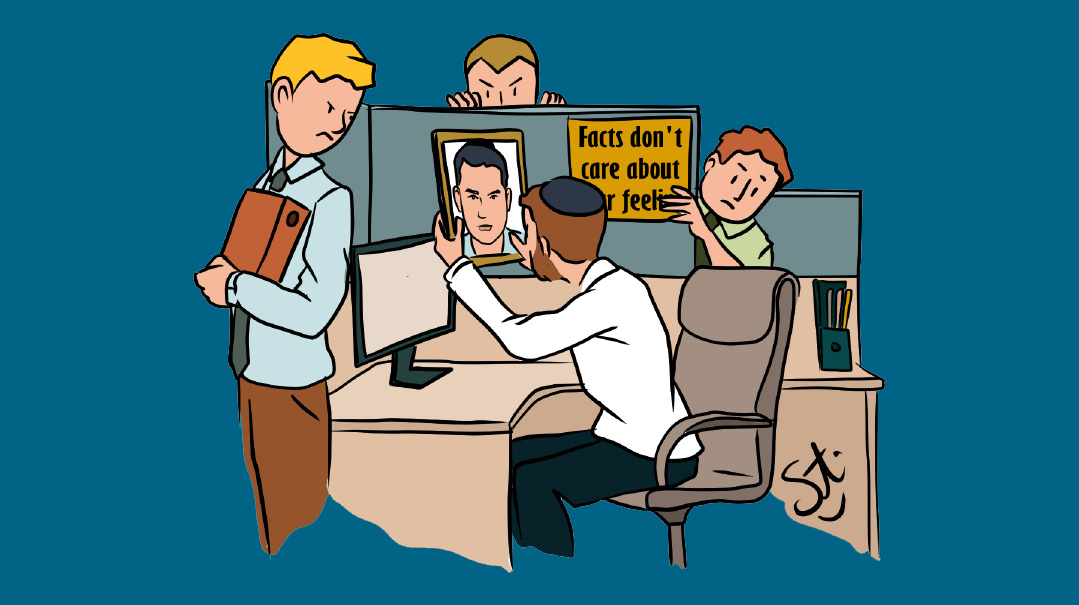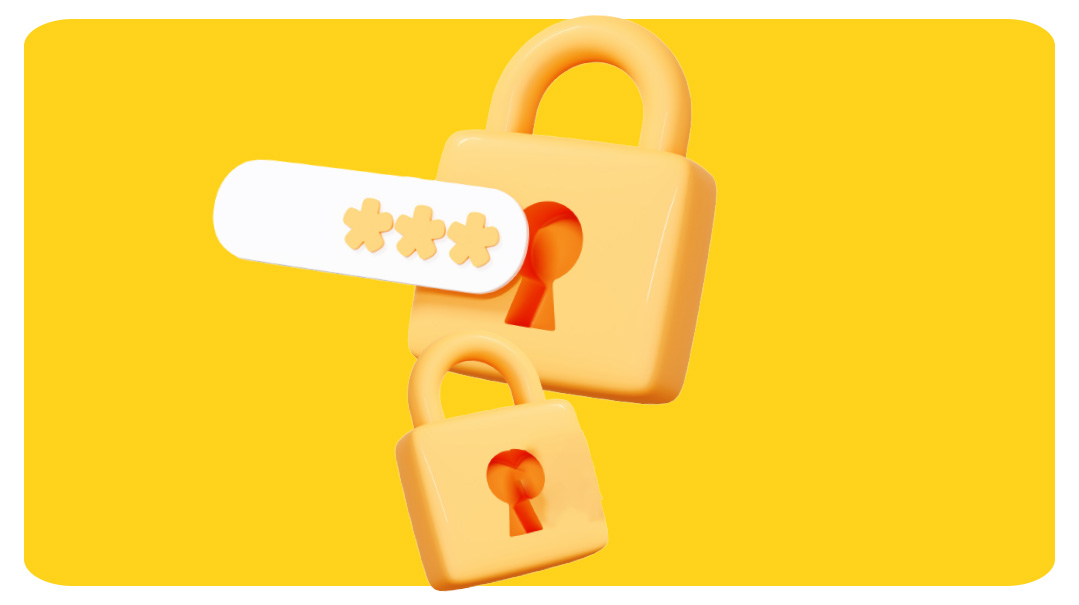They Don’t Teach Corporate in Yeshivah
| June 21, 2022Practical tips for those entering the secular workplace for the first time

Illustrations: Esti Saposh
“I don’t even know what I don’t know.”
A couple of weeks ago, a smiling student walked up to me after Minchah to share the great news that he’d secured an internship at a Fortune 100 company for the summer. After I offered my warm congratulations, his look turned much more serious. While he was excited about the opportunity, he had no idea what to expect in the corporate world and was nervous about it.
This student was certainly not alone. In my 14 years in Career Services at Touro University, I’ve seen this scene play out many times. Yeshivah graduates tend to be intelligent, hardworking, and motivated to succeed. They have the potential to be highly successful in the corporate world. But the biggest challenge they face is that “they don’t teach ‘corporate’ ” in yeshivah.
Adjusting to a foreign corporate culture can seem like an overwhelming task. (While frum women adjusting to the workplace might find themselves facing many of the challenges addressed in the article, I am much more familiar with yeshivah culture, so I’ve addressed the piece specifically to them. If someone wants to pick up the baton, I think “They Don’t Teach Corporate in Bais Yaakov” would be a great idea.)
Corporate culture often celebrates ideals and concepts that are very different from what a yeshivah graduate is used to. Most have probably never even considered the challenges posed by day-to-day corporate activities like handshakes, closed-door meetings, and business travel. Even fewer are prepared for a workplace where they may be considered the experts on Jewish beliefs, practices, and even current events.
That doesn’t mean a yeshivah graduate can’t successfully integrate into the workplace. Those that jump the corporate learning curve do very well; in fact, Touro has successful alumni in senior roles at most major companies. But the initial guidance they receive before they start is absolutely essential. As a student once remarked upon securing a corporate position, “I don’t even know what I don’t know.”
I made a follow-up appointment with that young man after Minchah to walk him through some of what he could expect in corporate America and the things he could do to increase his probability of success. Before he left the room, I gave him a crucial assignment to complete before our next meeting: to find a rav with expertise in business ethics and halachah who he could turn to with any questions.
When it comes to workplace challenges, my philosophy is that it’s never appropriate to compromise on your principles or halachah for the sake of work. But the only way to hold firm is to accurately determine principles and halachos with a rav who specializes in these issues.
I always tell my students that I do not and cannot offer halachic or hashkafic advice. My job is to make sure they are aware of many of the challenges they may face, so that they can determine how to handle them in advance of the situation.
The Talmudic Advantage
“Most of my colleagues from San Bernardino and Riverside, California, had never even heard of the Talmud!”
There is no question that Talmudic study hones the mind and helps yeshivah students develop strong thinking and reasoning skills. As a member of the student government at a state college, I was immediately placed on the committee for rewriting the Student Government Constitution. My ability to understand the full meaning of the text and anticipate potential implications of word choice made me a valuable contributor to that committee as well as in my role as the eventual chair of the Charter and Rules Committee.
But while understanding and utilizing your skill set is essential for corporate success, be careful not to overestimate your ability. Some yeshivah graduates tend to understand the advantages of a Talmudic education, but underestimate the abilities of others.
Do you know what I found when I was working on my PhD at the University of California–Riverside? A large group of very intelligent people with exceptional reasoning and thinking abilities who had never studied a word of Gemara! In fact, most of my colleagues from San Bernardino and Riverside, California, had never even heard of the Talmud!
From conversations I’ve had with other yeshivah graduates who have attended top doctoral programs, my experience wasn’t unique. There are plenty of very smart people in the corporate world who can easily go toe-to-toe with yeshivah-educated men, so be prepared for that. Chochmah bagoyim ta'amin. Don’t overestimate your ability and make sure to approach team members and assignments with appropriate respect and humility.
Black and White and Gray
“The once-a-week Erev Shabbos shave isn’t considered professional.”
Corporations have certain expectations in terms of dress in the workplace. The more formal financial institutions usually expect employees to wear a starched shirt and a well-fitted suit, jacket, and tie.
One suit is not enough. Employees are usually expected to change suits a few times during the workweek, and ties and shirts on a daily basis.
I carry Tide sticks in my workbag so that I can clean small stains off my shirt. Accidents do happen, even if you’re careful. I’ve been sprayed by a car hitting a puddle on my way to work, so even the Tide stick couldn’t really help me there. Some professionals keep a back-up shirt and tie in their office desk.
Yarmulkes are not as much of a challenge as they were 50 years ago when employees were hesitant to wear them at work. Just make sure that your yarmulke is clean and neat. I always advise keeping a backup yarmulke in your workbag. I remember how once my yarmulke was blown off my head and landed on the train tracks where I couldn’t retrieve it.
If you wear your tzitzis out, make sure that they are clean, neat, and orderly, and do not get stuck in zippers, buttons, etc . Speak to your rav about the possibility of tying the tzitzis strings around your belt at work if necessary.
Sometimes, the culture in start-up corporations is even more challenging because the dress code is much less formal, possibly even T-shirts and jeans. The solution is not to simply wear more professional clothing than your colleagues. Wearing clothes that are too formal can negatively impact your acceptance as a member of the team. If that is the case, speak with your rav or find an appropriate means of more casual dress that still comports with your status as a ben Torah.
Professionals are normally expected to shave every day if they don’t have a beard. The once-a-week Erev Shabbos shave isn’t considered professional. Inform your manager and team about the times during the year when shaving is prohibited. Speak to a rav if that presents a professional problem for you.

On Time, All the Time
“On time in the corporate world does not mean before Baruch She’amar at Shacharis.”
I am sure we’ve all heard many jokes about “Jewish Standard Time.” On time in the corporate world does not mean before Baruch She’amar at Shacharis. Be on time, all the time.
This doesn’t only refer to the start of the workday. It’s important to be on time for meetings, after returning from lunch or Minchah, etc.
Language Barrier
“They don’t speak yeshivish in corporate America.”
I’m frequently asked what my biggest challenge was going directly from yeshivah to a state college. The answer: the inability to appropriately express myself without resorting to yeshivish jargon. It took me almost two years of college until I was confident that I wouldn’t accidentally use a yeshivish term when speaking.
They don’t speak yeshivish in corporate America, so make sure that you’re able to express yourself in standard English. Don’t let your guard down when you see another yeshivish person in the workplace. Always default to standard English unless and until you develop a relationship with that colleague that would allow for more relaxed discussions.
Often there are words and expressions used in corporate America that have very different meanings from what we are accustomed to. I got my master’s degree from Loyola University, a Catholic college. One day, after taking the train to class, I saw a sign on the first campus building door that read “Mass Cancellation.”
Dejected, I turned to one of my classmates walking nearby and said, “They canceled everything? I came all the way down here…”
My classmate laughed and told me that they had canceled Catholic Mass in the chapel that day. (I was shocked that they could do that; after all, I’d never seen a shul that canceled Minchah). Be aware of the meanings of words and phrases as they are used in your profession.
After many years in yeshivah, and many arguments over pshat, I’ve developed the unfortunate tendency to raise my voice, speak more quickly, and argue vociferously when disagreeing with a colleague. In the corporate world, that is perceived as aggressive and disrespectful. I don’t mean to sound aggressive, but I still struggle with it. Try to disagree respectfully in an even tone and nonaggressive-sounding voice
It’s also important to be aware that there are some workplaces in which inappropriate language is used. This is still pretty rare in the “old school” corporations, but it does happen, and you may need to prepare yourself for hearing words that we normally don’t use.

Internet Etiquette
“A quick check on Matzav for the latest news isn’t harmless.”
Generally, you’ll be given a work email as soon as you are employed. That means that every email you send (and receive) reflects on your employer. It’s essential that you remain professional in all of your email correspondence.
Respond promptly and professionally to emails that you receive. Most employers assume that their employees have smartphones with the capability to respond to work emails, even when they are out of the office.
They also assume that employees have access to high-speed Internet at home. Some of the security and firewall requirements for accessing work material at home may not be compatible with kosher filters. In that case, speak to your rav. One solution may be to have a dedicated work laptop that allows your employer to see all of your Internet browsing.
Err on the side of being more formal in your emails to others, and be aware that many employers have rules that prohibit conducting business on private email accounts.
When you log in to your work computer, your employer can see all the websites that you visit. That can also be true for a smartphone that is connected to the work Wi-Fi. A quick check on Matzav for the latest news may seem harmless, but many companies have policies about private Internet browsing during work time. Be careful to follow those rules.

Politically Correct
“Believe it or not, there are plenty of people out there who do not agree with Ben Shapiro.”
I’ve spoken to a number of yeshivah graduates about to enter the corporate world who didn’t really think about their coworkers. Their plan was to work hard, do their job, and go home. Unfortunately, that isn’t realistic in today’s corporate world. Teamwork and collegiality are highly valued. Employees are often chosen for “fit” as much as qualifications. Ignoring your coworkers, or even worse, self-segregating with only other frum Jews, will be viewed negatively.
There tends to be a very strong echo chamber in the Orthodox world. Believe it or not, there are plenty of people out there who do not agree with Ben Shapiro (and, yes, they can debate him when given the chance on even terms).
Conservative politics seem to be almost ubiquitous in the yeshivah community, but it’s essential to realize that they aren’t the mainstream. As passionately as we may feel about certain conservative principles, the people we interact with often have very different opinions.
My advice: Unless you work in the political realm, stay out of political discussions at work. That isn’t necessarily easy, especially as coworkers passionately defend ideas that you find horrific, but politics at work is a no-win situation.
The no-politics at work rule applies to public forums as well. While LinkedIn has become very popular among frum professionals, it’s very important for people to realize that even if the majority of people engaging in their posts are frum, social media isn’t a yeshivah coffee room. People outside the community see our posts. That means that people at work may very well see political posts you make on LinkedIn and get upset by them.
It’s also quite possible that some of your coworkers have had very different experiences with law enforcement than you have. Learn to respect those differences in the workplace and avoid discussions about racial, policing, and equity issues.
Definitions and conceptualizations about morality are radically different in the corporate world than in the yeshivah world. You will almost certainly encounter and work with people whose personal relationships run contrary to your values. It’s important to be prepared for that.
Family comes up a lot among colleagues, from family pictures on an office desk to excitement about life-cycle events. Reacting negatively will not only be seen as a violation of basic professional standards, it could very possibly be used as grounds for termination.
I got a call the other week from someone who was upset. His employer was requiring all employees to list their preferred pronouns in their email signature line. That issue also comes up frequently on name badges at conferences.
I asked the caller to tell me his preferred pronoun. He said that they are “he/his.” I told him that he may not agree with the company mandate politically and that he should speak to his rav if he isn’t comfortable, but I don’t see why using male pronouns for a male would be problematic.
References to American popular culture come up frequently in the workplace. That is no different than the conversations we might have about the latest Mordechai Shapiro song. Frum employees may feel uncomfortable in such conversations because they aren’t familiar with many of the cultural references used by their colleagues.
During World War II, one of the most effective ways American soldiers used to screen for German impostors was by testing their knowledge of American pop culture.
My advice is to not try and fake it with popular cultural references. It will be obvious if you don’t know what you are talking about. If you’re a knowledgeable sports fan, that can be used as a way to engage in those same kinds of conversations.
Speak for the Jews
“A classmate of mine once asked to see my horns.”
One of the biggest surprises I encountered when I went to a state college was how frequently classmates (and even professors) asked me to explain the Orthodox Jewish belief system. It’s hard to believe, but a classmate of mine once asked to see my horns (based on an old anti-Semitic belief)!
It wasn’t just evangelism (although there was plenty of that) that I encountered. Often, they wanted to know the Jewish perspective on current events, etc. Personally, I am happy to answer any sincerely asked questions, no matter how misinformed.
It is important to understand that most people aren’t well informed about the frum community. While we all may know the latest “hock,” what they believe is often based on what’s presented in the media.
Over the last couple of years, colleagues of mine in career services and corporate HR frequently asked me questions about the Orthodox Jewish response to Covid based on the portrayals they’d seen in the news. I told them not to believe everything they see on the news. (The term “fake news” can have negative connotations.)
Most often, I’m asked for my explanation about current events in Israel. I want to reiterate that to people who are not as invested in frum life, what they see in the media informs their perspective on issues.
You may not be comfortable answering religious or political questions. As a matter of fact, it’s probably advisable to try to avoid them as much as possible when you first start out. It is okay to say that you don’t know the answer (I’ve told people that I am not a rabbi). Generally most coworkers will leave it at that. If you really want to extend yourself, you can put coworkers in touch with more knowledgeable people in the community who are accustomed to working with the larger society.
Party Time
“Did you know professional conferences can lead to mixed dancing?”
One of the more complicated issues to navigate has to do with office parties and celebrations. Remember that it’s important to be seen as part of the “team” in the corporate world.
Most companies have some form of holiday party in late December. Many have family barbecues for July 4. Often these parties serve alcohol. Professional conferences often have parties that can feature live music and even dancing. Conferences usually last several days and can be held over Shabbos.
It’s not uncommon for team members to celebrate a big contract or the completion of a successful project at a nonkosher restaurant, or even a bar. Speak with your rav for guidance on all of these issues.
Life-Cycle Events
“There were weeks of funerals, most of which were held in churches.”
I have a relative who worked in the World Trade Center on 9/11. She was getting off the bus, and actually saw the first plane crash. She immediately went home, but sadly scores of her fellow employees died that day.
There were weeks of funerals, most of which were held in churches. Based on the guidance she received from her rav, she came to each funeral and stood outside the church to pay her respects without going in.
It was obviously a very emotional time, and many of her coworkers felt that what she was doing was disrespectful, but she stood by her principles.
It’s not uncommon to receive invitations from coworkers to life-cycle events such as engagement parties, weddings, funerals, etc. These events aren’t always held in religious institutions. Speak to your rav for guidance about attending such events.
Most employers offer some form of bereavement leave. The concept of sitting shivah and missing a full week may not be understood (especially outside of the New York area). If that issue comes up, be sure to inform HR and your manager about your religious mourning needs. It’s also advisable to let them know that you will be unable to shave for the shloshim period.
Gedalya Goomber, 2022
“An employee claimed he needed eight days off for Chanukah.”
There are a number of religious accommodations that frum Jews will require in the workplace. These include things like time for Minchah during the short winter months, kosher food, as well as Shabbos and Yom Tov arrangements.
It’s essential to inform your employer that you will miss days due to Yom Tov, and the need to leave early for Shabbos during the winter. I personally don’t believe that subject needs to be broached during the interview process, but it is important to have this discussion with HR when you are agreeing to the terms of your employment.
Yom Tov can take up as many as 13 workdays during the year (and that does not include Purim and Tishah B’Av). Make it abundantly clear that your need to take off those days will not negatively impact your workload or your performance.
Most employers require that employees use their vacation and personal days for Yom Tov. Frequently, frum employees will be expected to work late nights to make up for early Fridays.
Be completely honest about your religious needs. I heard a story about an employee who claimed he needed eight days off for Chanukah. A frum person in HR saw his request, and it was not received kindly.
Sometimes the Jewish calendar works to your advantage. It can be very helpful for your company to offer to be in the office the last week in December when a large number of your coworkers will be on vacation.
Speak to your rav about the need to work over Chol Hamoed or on Tishah B’Av, and remember tax season is almost always on or around Pesach.

Kosher Style Isn’t Kosher
“I thanked the organizers profusely for accommodating me before throwing out the meal.”
Kosher food is readily available in most major US cities, but never assume your company knows that you need kosher food. If they’re having an event with food, make sure to mention that you require special accommodations.
Not everyone understands kashrus, even in the New York area. I was once at a multicampus event in which the organizers provided deli sandwiches to the kosher attendees from a “kosher style” deli that was not kosher at all. I thanked the organizers profusely for accommodating me before throwing out the meal after lunch was over.
This can be even more complicated when you travel. I’ve spoken in 15 US states (and a Canadian province). Kashrus can be very complicated in cities outside of the major frum communities. Speak to a rav who is an expert at kashrus about appropriate hechsherim in other cities and states. There can also be multiple kashrus agencies in some cities, with different levels of reliability. And remember, just because there is a legitimate kosher option in a city does not mean that the conference organizers will get their food.
You also need to be on the lookout when you receive your reliably certified meal. Event organizers may not realize that kosher food needs to remain sealed. After I gave my first conference presentation about ten years ago, I was looking forward to a nice break and lunch. I breathed a sigh of relief after getting through the speech and walked out. The waiter handed me a plate of food covered in saran wrap with the word “Kosher” written on the top in black marker. That meal ended up in the garbage too.
I have received meals with a reliable hechsher in which the seal was punctured. I have also received correctly sealed meals, served on the regular plates and utensils used for the rest of the event. I have ordered food from reliably kosher restaurants that have delivered them unsealed to the hotel concierge. Check everything carefully.
You can get kosher food at most supermarkets in the United States, but not all companies pay for a rental car. That may mean it is difficult to get to a supermarket near the conference center. When I travel, I usually bring a pack of challah rolls and a jar of peanut butter just in case. Check to see if there is a refrigerator available for your room if you bring perishable food items. I also bring a stack of paper plates and utensils.
Speak to your rav about how to handle eating your kosher meal at an event or at a table with colleagues who are eating nonkosher food.
Male/Female Interactions
“Closed-door meetings can happen as part of an interview or performance review.”
Some of the most challenging workplace issues involve interactions between men and women.
Handshakes are part of everyday business in America, and you must speak to your rav to get a psak about shaking hands with women. Be aware that there are multiple circumstances that can impact that halachic decision, for example, what to do if their hand is extended to you on stage during a public event (that does happen).
Speak to your rav as well about how to handle closed-door meetings with a woman. Closed-door meetings can happen as part of an interview or performance review, or more frequently, depending on your work situation.
Chaim Shapiro, MEd is the director of the Office for Student Success at Touro University, a freelance writer, public speaker, LinkedIn consultant, and a Board Certified Coach specializing in career coaching. Chaim earned a master’s degree in college student personnel from Loyola University, Chicago, and also studied in the Institutional Leadership and Policy Studies PhD program at the University of California–Riverside Graduate School of Education. He has more than 18 years of experience working in college administration.
(Originally featured in Mishpacha, Issue 916)
Oops! We could not locate your form.







